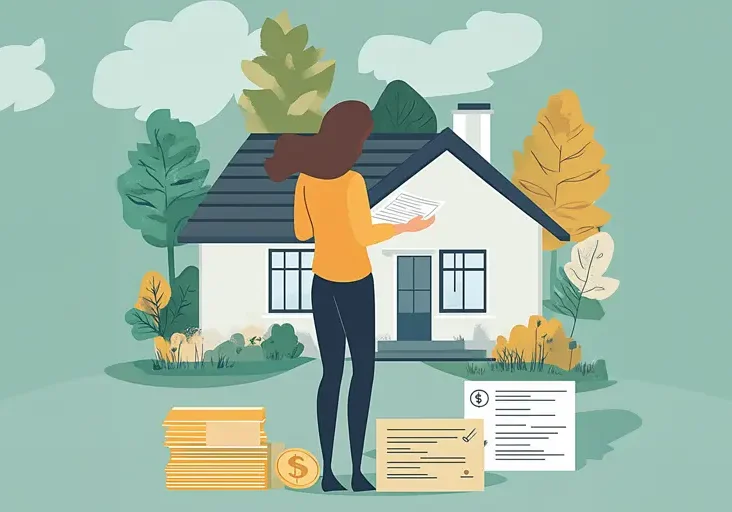Taxes on Selling a House Illinois
Selling a house is a major financial decision, and while homeowners often focus on the sale price, it is equally important to understand the tax implications. Many people are surprised by how taxes can affect the final amount they take home. At Trusty House Buyers, we specialize in buying homes in as-is condition, including properties damaged by fire, flood, storms, or neglect.
That means: No repairs, No cleaning, No inspections, No waiting.
If you are wondering about taxes on selling a house Illinois, you are not alone. Homeowners across the state have questions about capital gains, exemptions, and how selling to a cash home buyer can impact their tax situation. This guide will explain the main tax considerations, how they apply in Illinois, and what options you have to minimize your tax burden.
How Selling to Trusty House Buyers Can Help
While we are not tax advisors, many homeowners choose to sell to Trusty House Buyers because we simplify the process and help you move quickly. If you are worried about taxes on selling a house Illinois, a fast cash sale can help you avoid the complications of a drawn-out traditional listing.
We buy homes in any condition, whether it is your primary residence, a rental, or an inherited property. With us, you do not have to worry about repairs, inspections, or waiting for buyer financing. We pay cash and close on your schedule, giving you control and peace of mind.
Interested? Check out How it Works in more detail!
Get Your Free Cash Offer Now!
Fill out this form to get your no-obligation all cash offer started!
Get Your Free Offer TODAY!
Fill In This Form To Get Your No-Obligation All Cash Offer Started!
Do You Have to Pay Taxes on Selling a House Illinois?
The first question many homeowners ask is simple: do you have to pay taxes on selling a house Illinois? The answer depends on several factors, including whether the property was your primary residence, an investment property, or a rental.
When you sell your home for more than you paid for it, the profit is considered a capital gain. The IRS taxes these profits, but there are exceptions and exemptions that can reduce or even eliminate your tax liability. Illinois follows federal guidelines for capital gains taxes, which means your specific situation determines how much you owe.
Capital Gains and Exemptions in Illinois
When it comes to taxes on selling a house Illinois, capital gains tax is one of the most important aspects to understand. Here’s what you need to know:
Primary residence exemption - If the property was your main home for at least two of the last five years, you may qualify to exclude up to $250,000 of profit ($500,000 if married and filing jointly) from capital gains taxes.
Investment or rental properties - If you are selling a property that was used as a rental or investment, you typically cannot use the primary residence exemption. Instead, the entire profit may be subject to capital gains tax.
Short-term vs. long-term - If you owned the home for less than one year, the gain is taxed as ordinary income. If you owned it longer than one year, it qualifies for lower long-term capital gains tax rates.
Understanding these distinctions is essential when calculating taxes on selling a house Illinois.
State Taxes on Selling a House Illinois
In addition to federal taxes, homeowners also need to consider state-level obligations. While Illinois does not have a separate capital gains tax, profits from a home sale are considered part of your taxable income and are subject to the state’s flat income tax rate.
This means that your overall tax burden will include both federal capital gains taxes and Illinois state income taxes. Planning for both is key to understanding the full picture of taxes on selling a house Illinois.
Hear From Other Homeowners
Shan K.
"Awesome experience!"
"Awesome experience! First time selling a property and the home selling process was quick and smooth. The team is very caring and accommodating. I would definitely recommend them to anyone!"
Billy Becker
"Would recommend to all!"
"I had a great experience working with this group. They answered every question and left me feeling totally satisfied with the transaction. Would recommend to all!"
Brandon Doctor
"Paid more than other cash buyers"
"I have done several deals with this company and they have always treated people fairly and paid more than other cash buyers I’ve talked to."
Get Your Free Cash Offer Now!
Fill out our form to get your free, no-obligation cash offer.

Strategies to Reduce Taxes on Selling a House Illinois
The good news is that there are strategies available to help reduce or even eliminate your tax burden:
Take advantage of the primary residence exemption if you qualify.
Use a 1031 exchange when selling an investment property to defer taxes by reinvesting in another property.
Track improvements - Home improvements can increase your cost basis, reducing your taxable gain.
Consult with a tax professional - Every situation is unique, and expert advice can help you save money.
By planning ahead, you can reduce the impact of taxes on selling a house Illinois and keep more of your hard-earned equity.
Feel free to check out our facebook page and our youtube channel.
Depreciation Recapture for Rental Properties
If you are selling a rental property, another important factor is depreciation recapture. Over the years, you may have deducted depreciation on your rental property to reduce your taxable income. When you sell, the IRS requires you to “recapture” that depreciation, which means paying taxes on it.
This can significantly affect the total taxes on selling a house Illinois, especially if you owned the property for a long time. Many landlords are caught off guard by this, making it important to plan ahead with the help of a tax professional.
